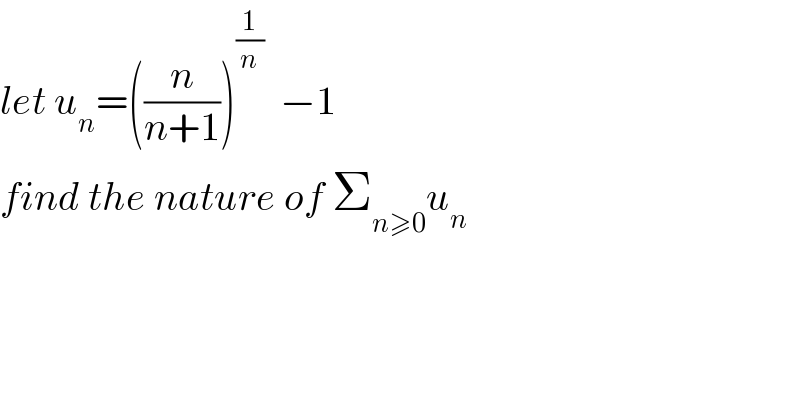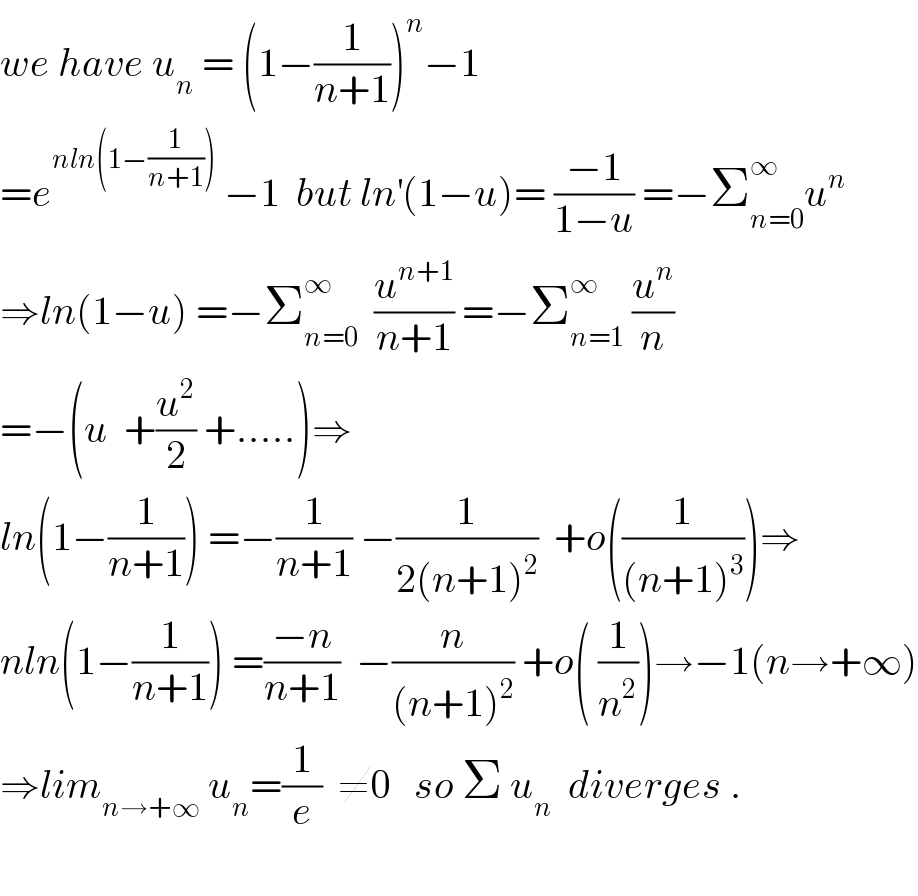
Previous in Relation and Functions Next in Relation and Functions
Question Number 35057 by math khazana by abdo last updated on 14/May/18

$${let}\:{u}_{{n}} =\left(\frac{{n}}{{n}+\mathrm{1}}\right)^{\frac{\mathrm{1}}{{n}}} \:\:−\mathrm{1} \\ $$$${find}\:{the}\:{nature}\:{of}\:\sum_{{n}\geqslant\mathrm{0}} {u}_{{n}} \\ $$
Commented by prof Abdo imad last updated on 16/May/18

$${we}\:{have}\:{u}_{{n}} \:=\:\left(\mathrm{1}−\frac{\mathrm{1}}{{n}+\mathrm{1}}\right)^{{n}} −\mathrm{1} \\ $$$$={e}^{{nln}\left(\mathrm{1}−\frac{\mathrm{1}}{{n}+\mathrm{1}}\right)} \:−\mathrm{1}\:\:{but}\:{ln}^{'} \left(\mathrm{1}−{u}\right)=\:\frac{−\mathrm{1}}{\mathrm{1}−{u}}\:=−\sum_{{n}=\mathrm{0}} ^{\infty} {u}^{{n}} \\ $$$$\Rightarrow{ln}\left(\mathrm{1}−{u}\right)\:=−\sum_{{n}=\mathrm{0}} ^{\infty} \:\:\frac{{u}^{{n}+\mathrm{1}} }{{n}+\mathrm{1}}\:=−\sum_{{n}=\mathrm{1}} ^{\infty} \:\frac{{u}^{{n}} }{{n}} \\ $$$$=−\left({u}\:\:+\frac{{u}^{\mathrm{2}} }{\mathrm{2}}\:+.....\right)\Rightarrow \\ $$$${ln}\left(\mathrm{1}−\frac{\mathrm{1}}{{n}+\mathrm{1}}\right)\:=−\frac{\mathrm{1}}{{n}+\mathrm{1}}\:−\frac{\mathrm{1}}{\mathrm{2}\left({n}+\mathrm{1}\right)^{\mathrm{2}} }\:\:+{o}\left(\frac{\mathrm{1}}{\left({n}+\mathrm{1}\right)^{\mathrm{3}} }\right)\Rightarrow \\ $$$${nln}\left(\mathrm{1}−\frac{\mathrm{1}}{{n}+\mathrm{1}}\right)\:=\frac{−{n}}{{n}+\mathrm{1}}\:\:−\frac{{n}}{\left({n}+\mathrm{1}\right)^{\mathrm{2}} }\:+{o}\left(\:\frac{\mathrm{1}}{{n}^{\mathrm{2}} }\right)\rightarrow−\mathrm{1}\left({n}\rightarrow+\infty\right) \\ $$$$\Rightarrow{lim}_{{n}\rightarrow+\infty} \:{u}_{{n}} =\frac{\mathrm{1}}{{e}}\:\:\neq\mathrm{0}\:\:\:{so}\:\Sigma\:{u}_{{n}} \:\:{diverges}\:. \\ $$$$ \\ $$
